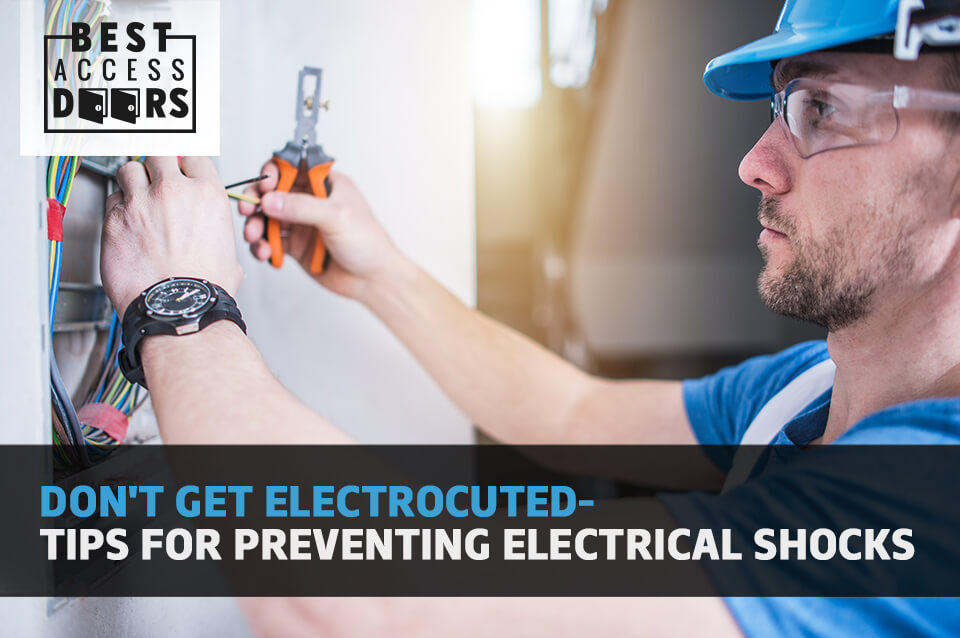Don't Get Electrocuted-- Tips for Preventing Electrical Shocks
Posted by Best Access Doors on 14th Oct 2020
In recent years, electrical shock injuries and accidents have become more prevalent as people become dependent on electricity and machines for work and producing commodities. That's why electric shock injuries and accidents became commonplace. Unlike electrocution, electric shock results in injuries that are significant. Some victims may suffer amputation, severe burns (either external or internal or both), cardiac arrest, heart muscle damage, or brain injuries. The stakes are so far up for electric shock victims, so we must all do everything to prevent electrical shocks. Although electric shock can be fatal, it does not mean that you cannot stop it.
Best Access Doors cares for you and your safety all the time. So, we have compiled these safety tips to help you prevent electric shock injuries and accidents. Read on to find out about these tips so you can apply them to your day to day activities.
1. Keep water and electricity away from each other.
Water is a conductor of electricity. That's why it is essential always to keep your electrical appliances away from water and moisture. A puddle of water may look harmless to you, but be aware of it, especially if there's construction around it. Safely check from a distance if there are any electrical wires in contact with the puddle.
2. Pay attention to your appliances.
When you keep experiencing an appliance that repeatedly trips a circuit breaker, gives you shocks, or blows a fuse, it's something that you shouldn't ignore and shrug off as a coincidence. Always take preventive measures and be mindful of those signs. Appliances that do this have internal problems such as exposed small electrical wires.
3. Ground Fault Circuit Interrupters (GFCI).
Nowadays, in new construction buildings, GFCI receptacles are a requirement in places where electrical outlets and water are close to another. Also, you should know to install them at the correct place to prevent severe electrical injuries.
4. Use the right-sized circuit breakers and fuses.
Keep in mind that using fuses and circuit breakers that aren't the right size and wattage rating will fail you when you most need them to perform. When you're shopping for replacements, read the details of the box carefully to know which one you should purchase. If you don't know what to choose, have a professional technician take a look at your electrical panel box and label it with the fuse size or circuit breaker you need to replace it.
5. Put up outlet covers.
Outlet covers help protect babies and small children from sticking their fingers or other objects into empty receptacles. That's why it is vital to put up outlet covers to protect anyone against shock and electrocution. You have many options, such as using the plug-in type or opt for individual child safety wall plates with built-in retractable covers that automatically snap back when the outlet is not in use. There were many instances where babies would get seriously injured even when you leave them out of your sight for a second, so never take chances and cover your outlets.
6. Don't use cube taps and other outlet-stretching devices.
When talking about cube taps, we mean those little boxes that allow you to plug several appliances into just a single outlet. Now, this may seem like a major convenience, but you probably didn't know that they can lead you to circuit overload, overheated wiring, and in worst cases, even fire. However, if you need to use one, make sure that you do the math before plugging in. Connecting multiple extension wires is also known as "Octopus wiring," since various wires are running on a single outlet.
7. Replace those missing or broken wall plates.
Wallplates are not just there for decoration. They also protect your fingers from making contact with the electrical wiring behind them. If you have broken plates or you don't have any of them at all, it can be especially dangerous in the dark when you're trying to locate a switch only by touch. If you hit live wires instead, you may get shocked or electrocuted. Even if you notice there are tiny, harmless cracks on the wallplates, it's better to replace them at once than waiting for it to crack and expose the wires behind it fully.
8. Ensure that electrically powered yard-care tools are always dry.
Never attempt yard work with electrically powered tools in wet conditions-- such as when it's raining, just finished showering, or you've recently run the sprinklers. Keep your electric hedge trimmer, weed whacker, and lawnmower safely unplugged and stowed away until precipitation has stopped and everything is dry. If ever you do need to use them right away even if they're wet, you have to dry them by using a cloth to wipe them thoroughly. Check the plugs and areas of the electrically powered yard-care tools where there's electrical contact.
9. Match the lamp to the light bulb's wattage rating.
Whenever you choose lightbulbs to use with a lamp, you must consult the lamp's wattage specification. Always choose a lightbulb with wattage that's equal to or less than the maximum wattage indicated on the light because a bulb that has too much wattage can lead to overloaded lamp wiring or even fire.
10. Treat your cords kindly.
Remember to treat power cords gently. Don't nail or tightly tack them down. It is also necessary that you regularly check them to make sure they're not pinching between or underneath furniture. Having excessive pressure on power cables can damage insulation, or compress the conducting wire, resulting in overheating and putting you at risk of an electrical fire.
One method of avoiding electrocution and electrical shocks is by keeping your electrical wirings protected with access doors built specifically for different electrical systems. Install access doors today, and shop from Best Access Doors.
Share our story - get our 2024 Catalog for FREE!

